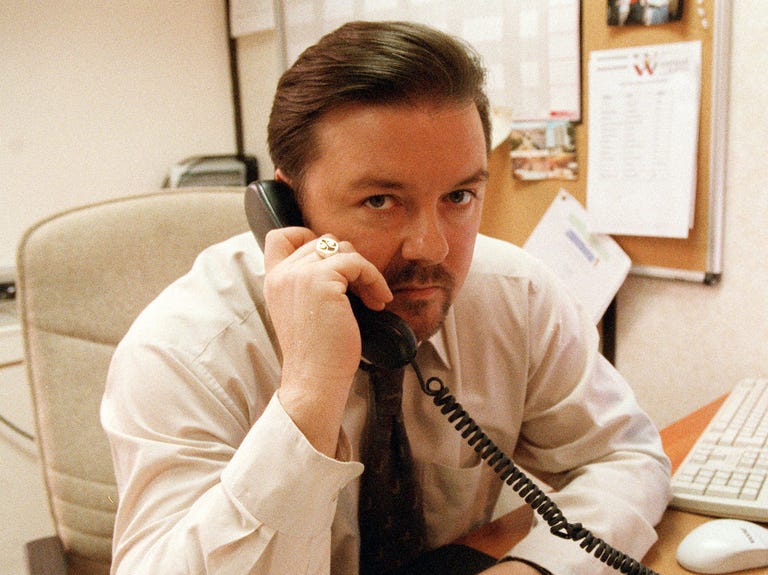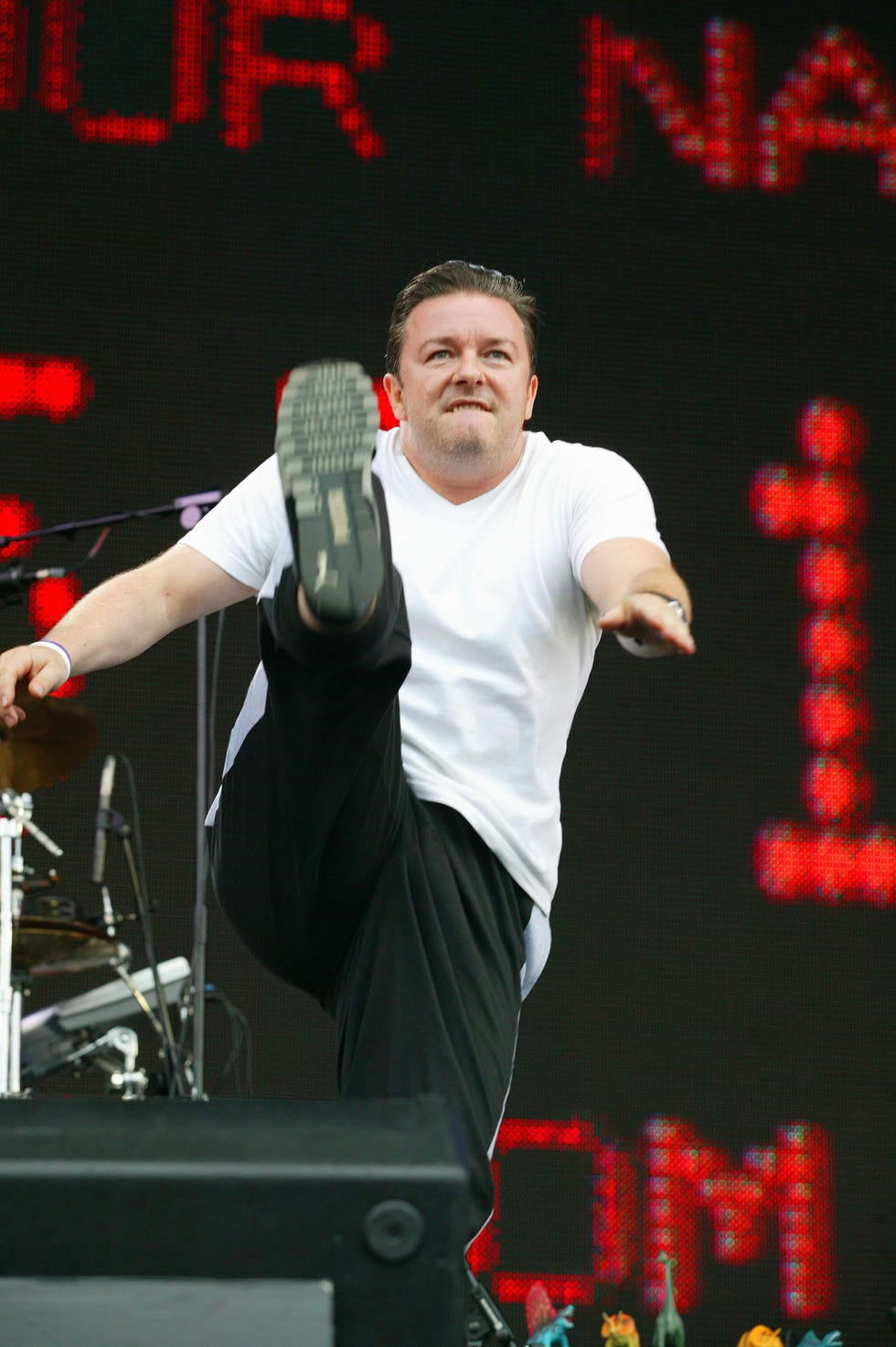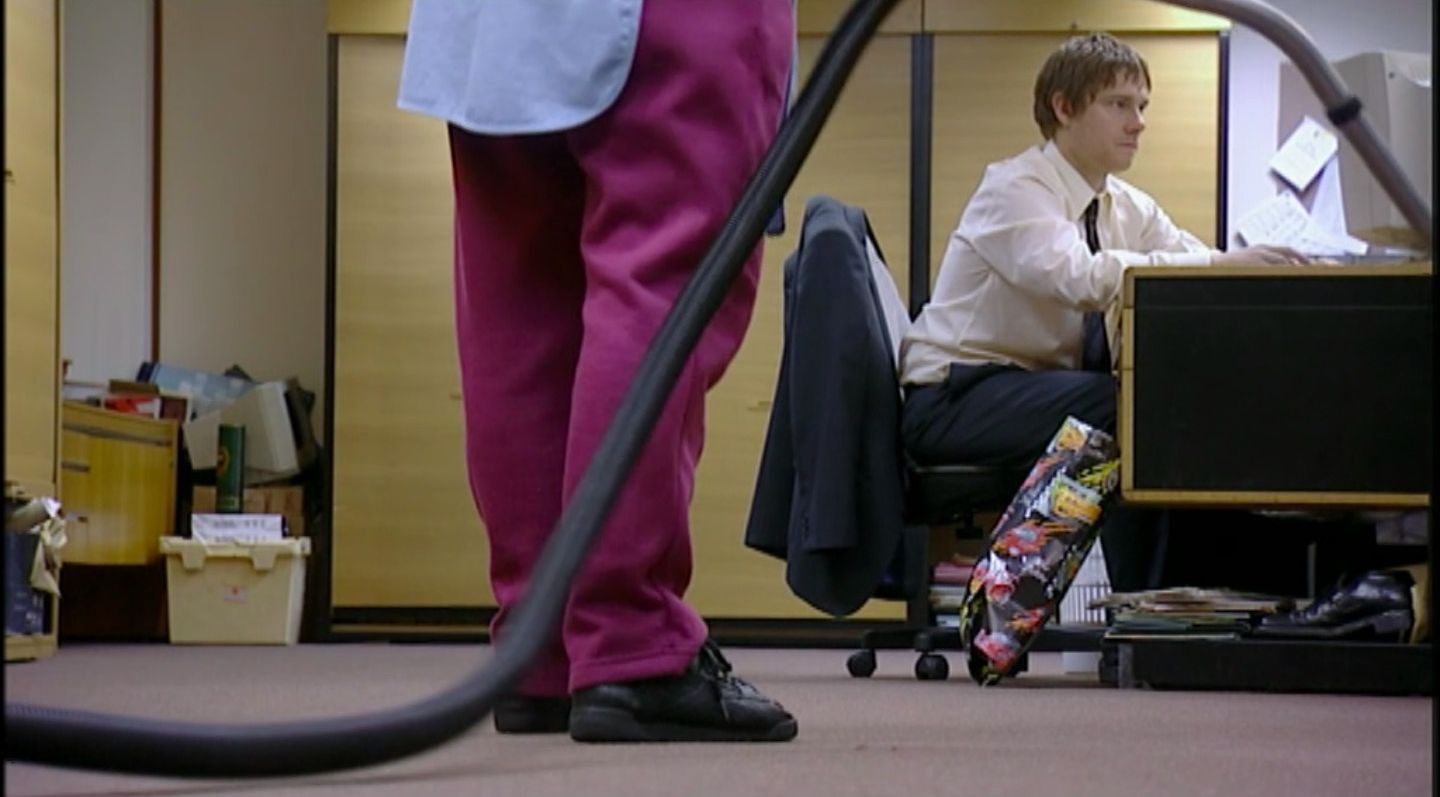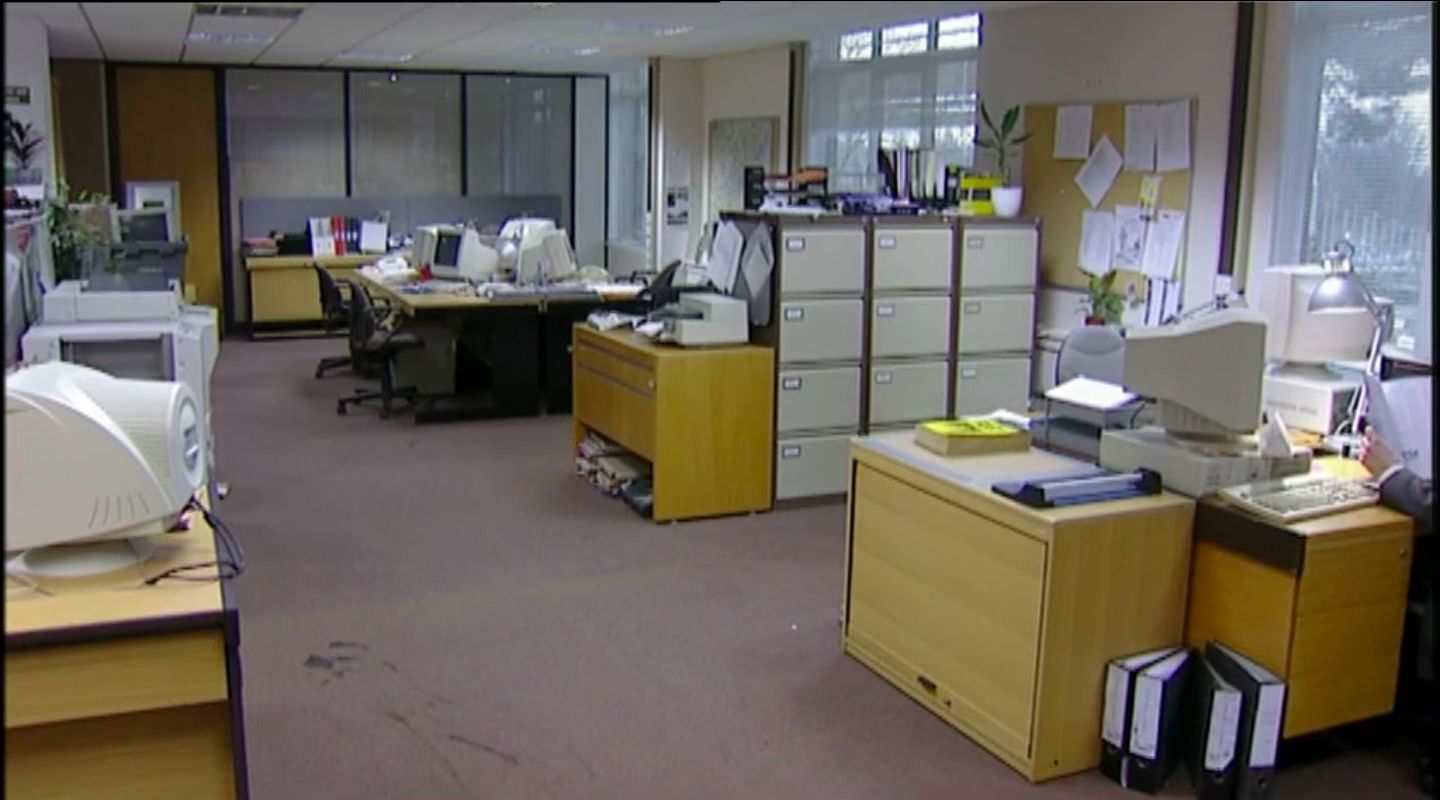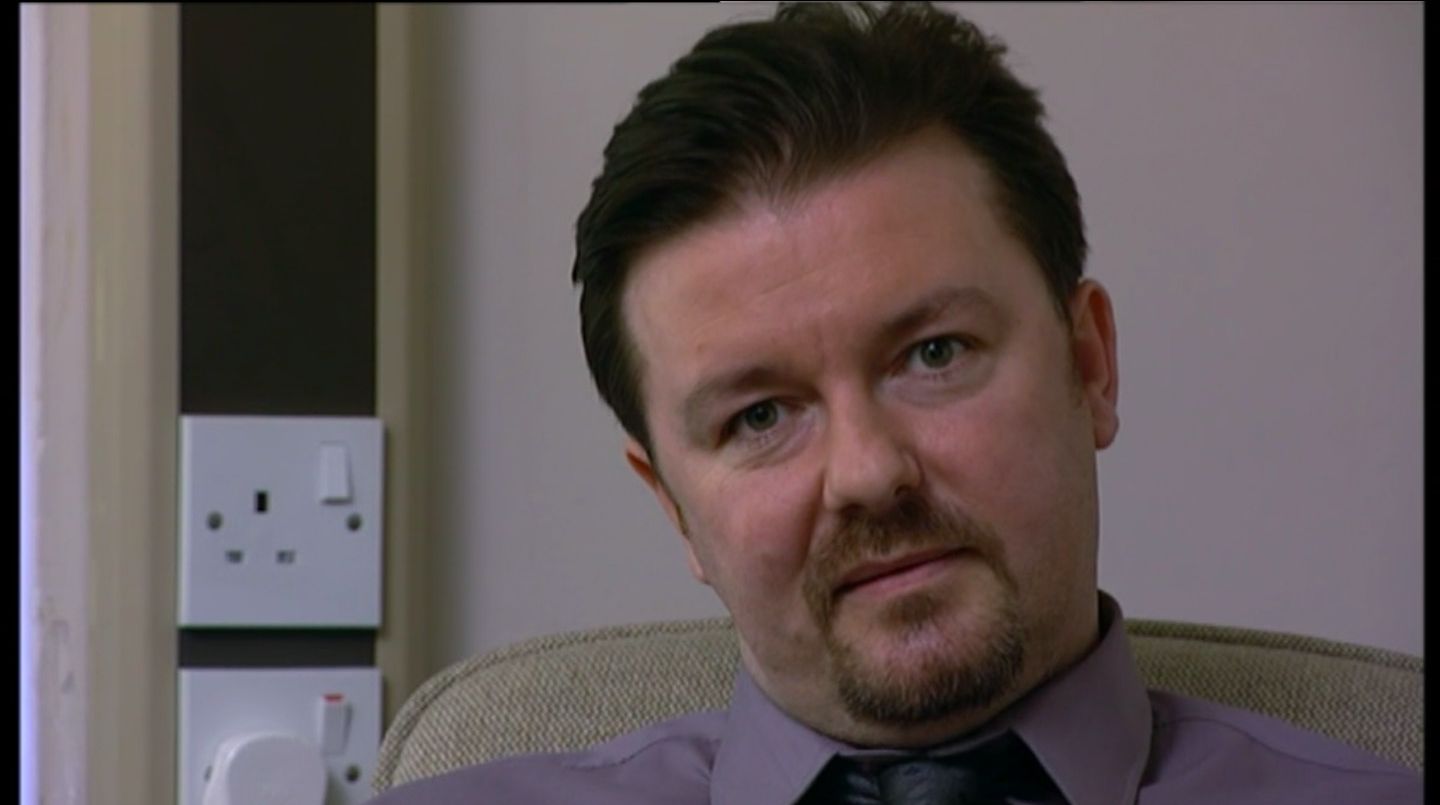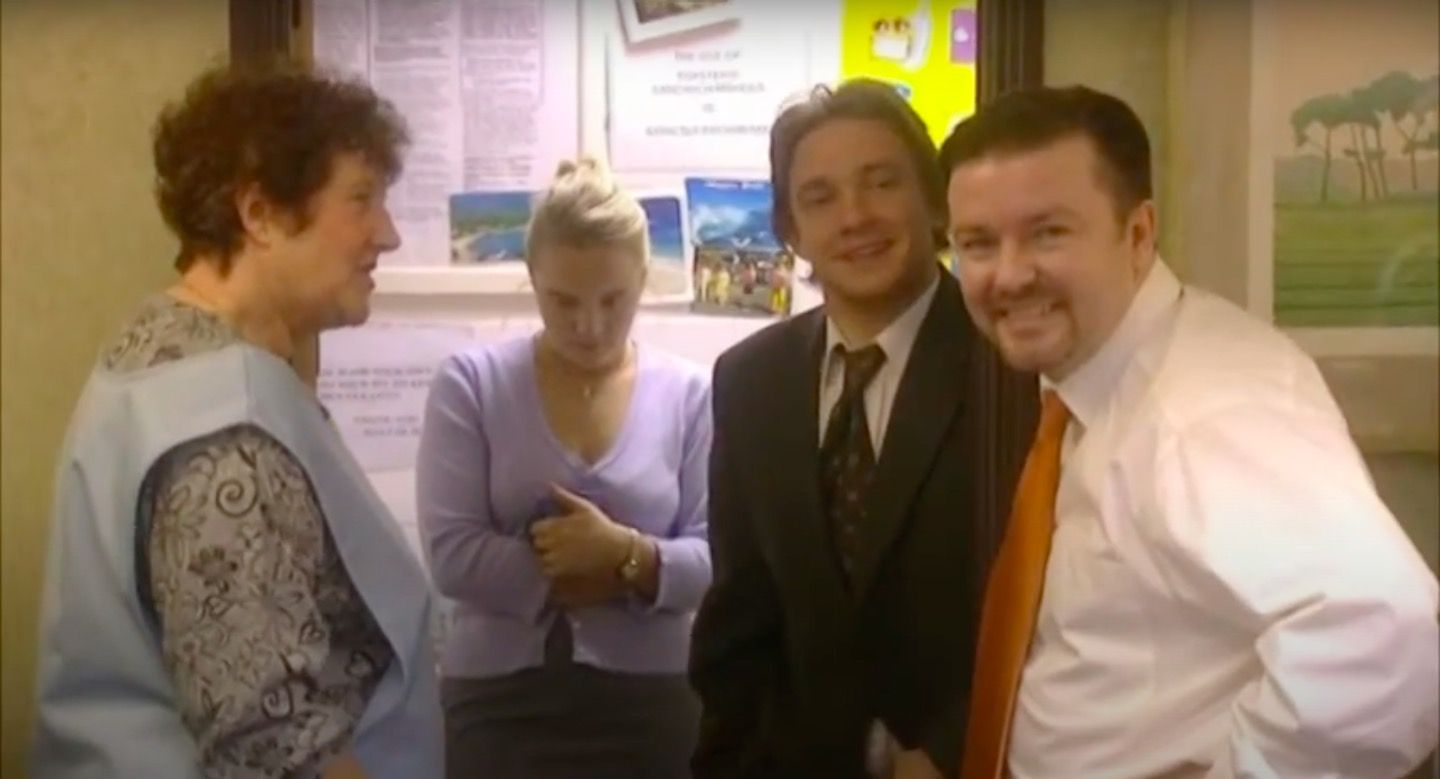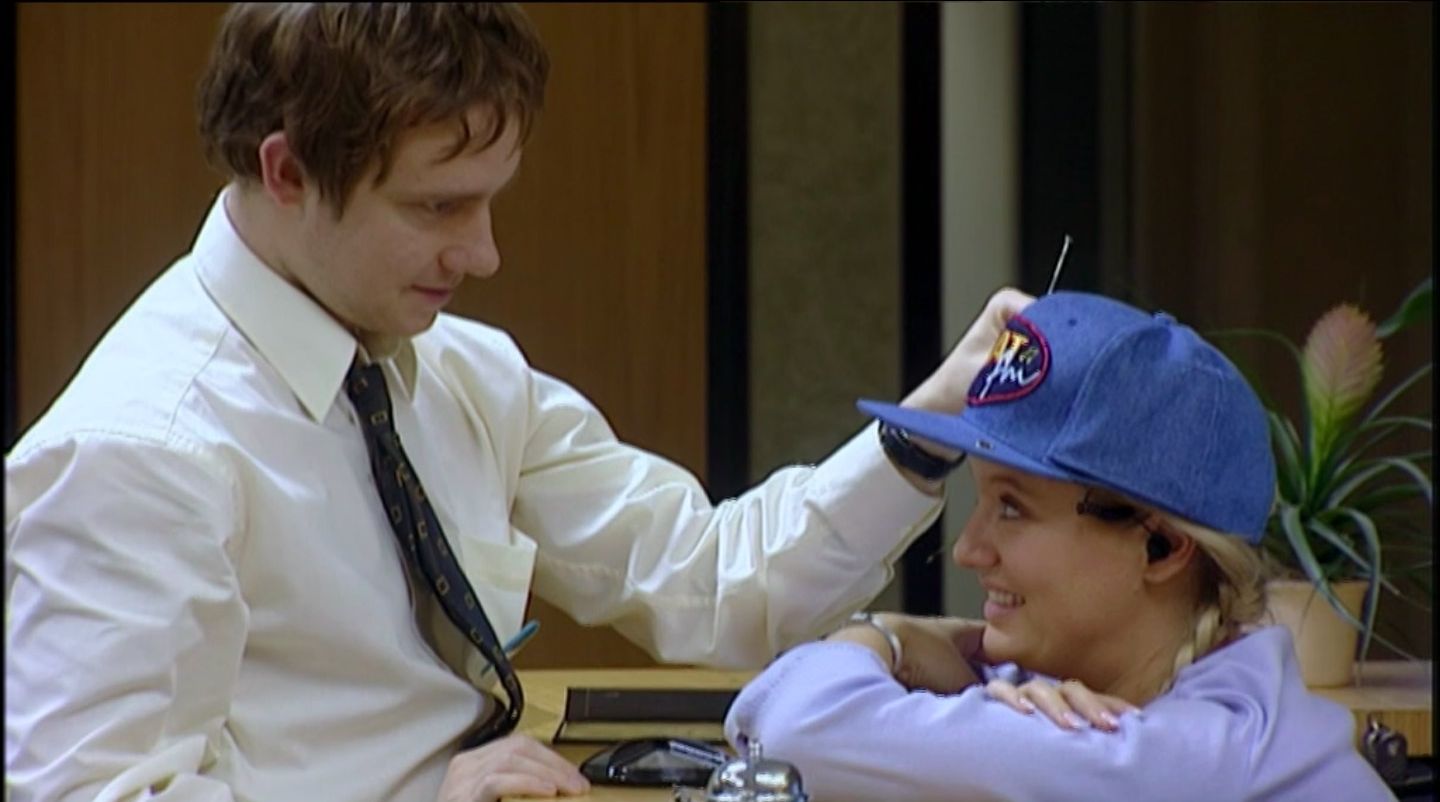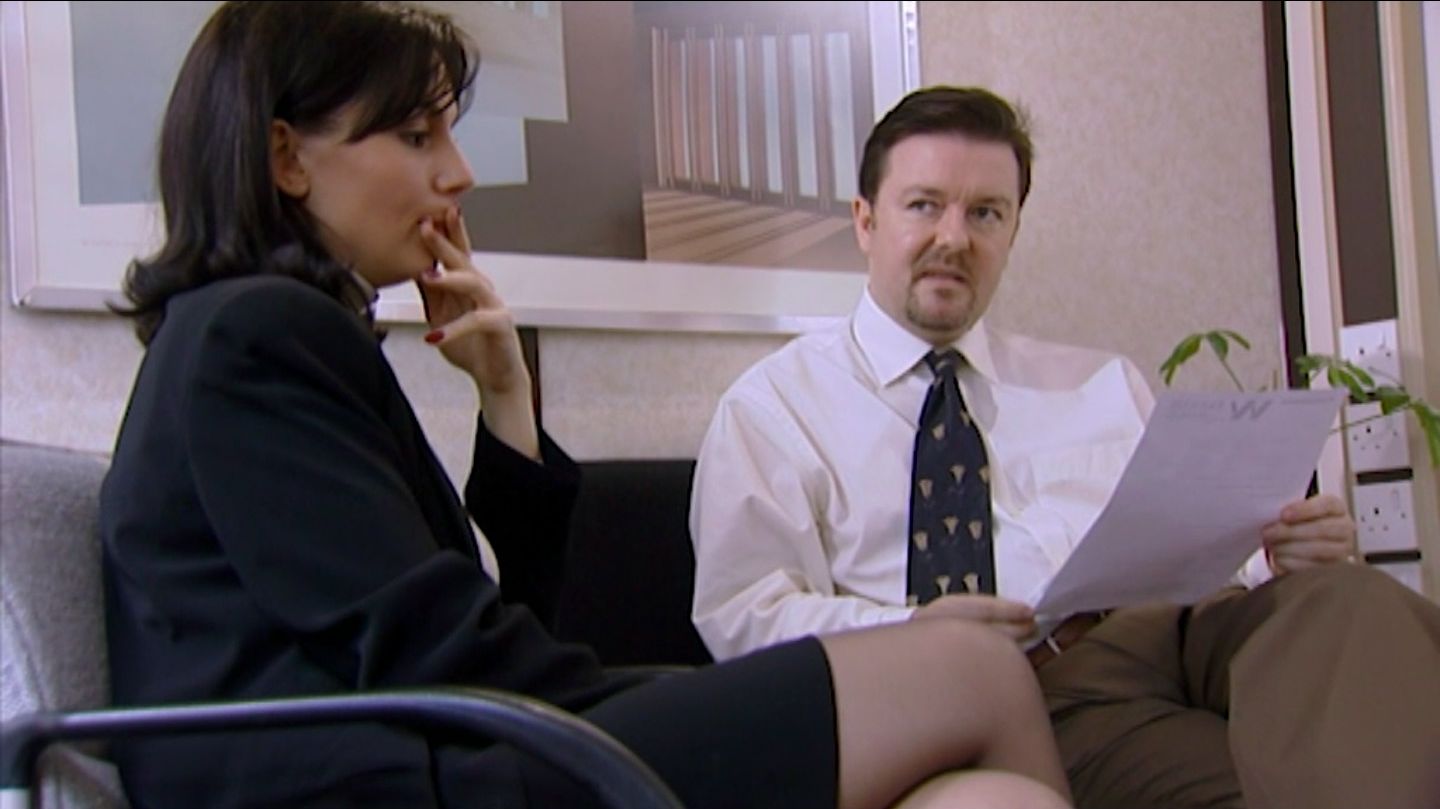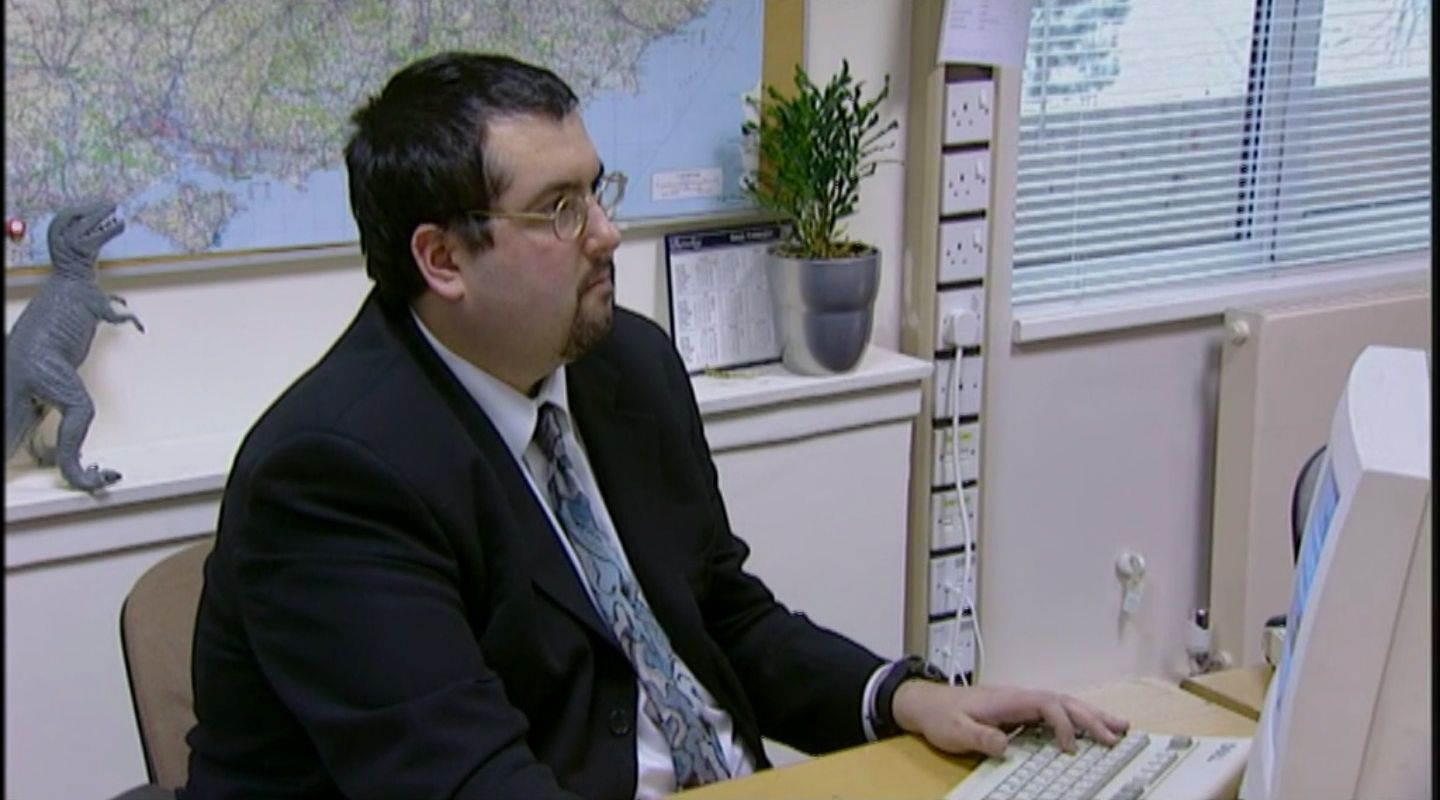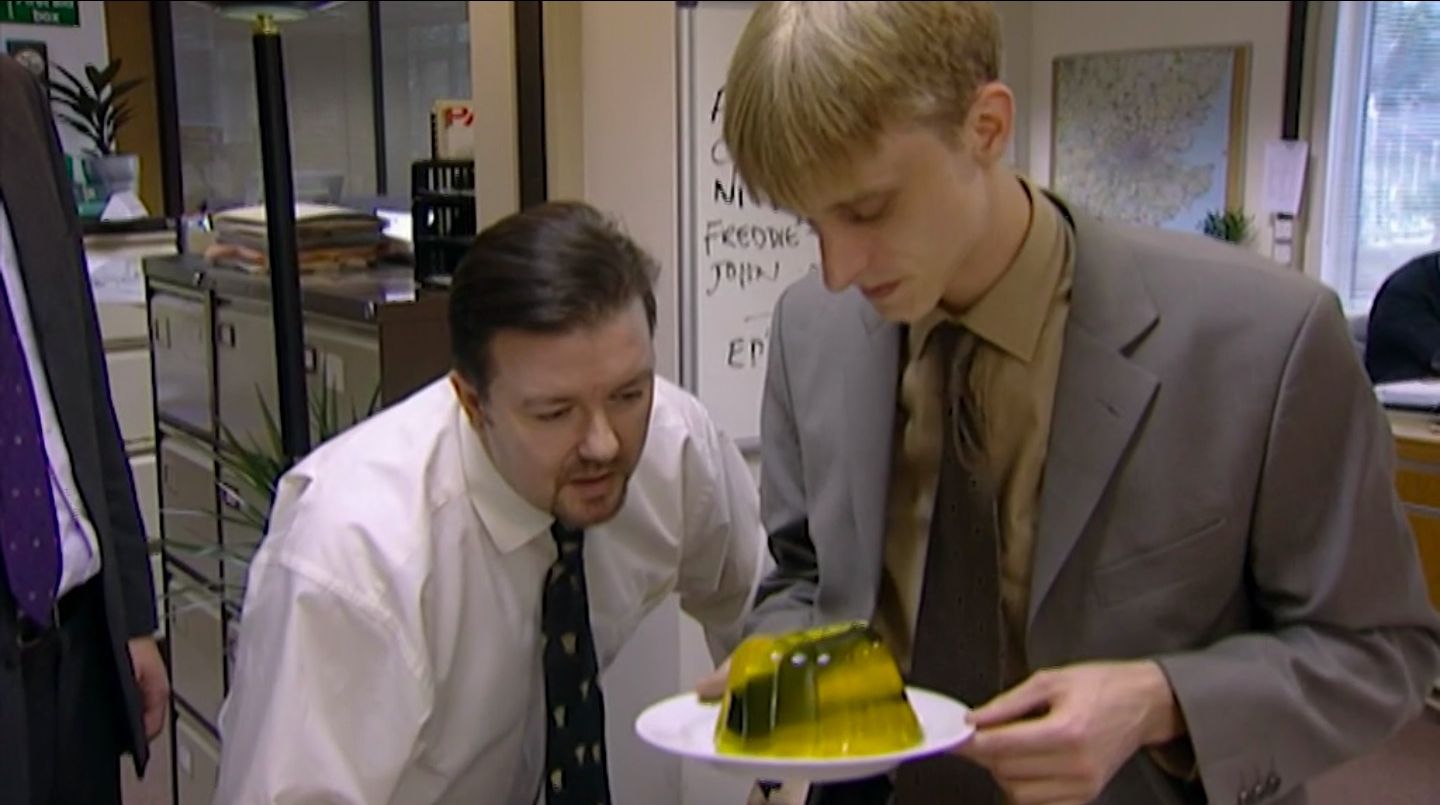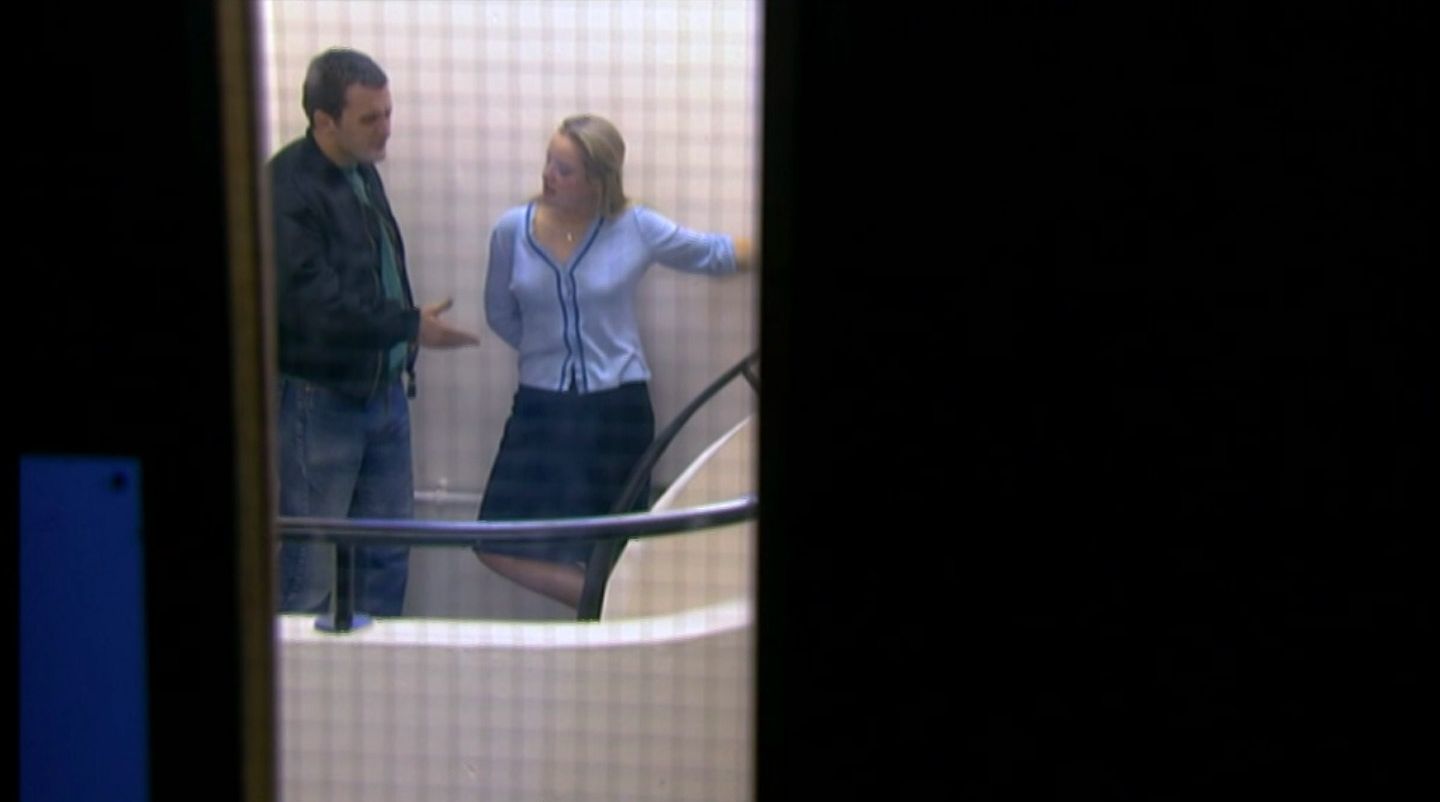Ricky Gervais strides onto a stage in Hyde Park wearing a shapeless white tee shirt and slouchy black joggers with a grey marl stripe down the side.
It’s a cloudy day in early July. Three-quarters of an hour ago, Bill Gates introduced Dido and Stereophonics to the 205,000 people who are here for Live 8. Soon, UN Secretary General Kofi Annan will welcome Ms Dynamite to the stage. The crowd stretches back and back and back from the edge of the Serpentine towards Marble Arch.
He’s halfway through a gag about voting Saskia out of Big Brother 6 when someone shouts something at him. He pauses. “Who said ‘do the dance’?”
A huge cheer goes up. They know what dance he means. Everyone would like him to do The Dance.
Boos ring around Hyde Park. “Okay! Okay! Oh…” Gervais giggles and cringes.
“Right. One time, ever. I’ll never do this again.”
And, hunching, he whirls into a sort of greatest hits package of half-remembered moves: the arms pulled up with elbows at right angles, a high kick, a one-legged spin, a crouching point out into the crowd. It lasts all of about eight seconds, but everyone’s happy.
Twenty years ago today, the doors of Wernham Hogg paper merchants in Slough opened for the first time. In the span of five years, Gervais and Stephen Merchant’s creation went from a no-budget student project to the kind of thing nearly all of a randomly selected group of British adults could roar for on a summer’s day.
It’s silly to call any piece of art perfect, but I think The Office might actually be perfect. It’s a rare example of the most innovative and experimental version of something also being the most popular. It’s fundamentally changed how groups of friends talk to each other. Despite being intensely 2001 in its preoccupations, inspirations and attitude, it’s timeless.
It wasn’t the first mockumentary – John Morton’s Bafta-winning pseudo-doc People Like Us, That Peter Kay Thing and Rob Brydon’s Marion & Geoff were all around in the couple of years beforehand – but it was so fully realised that it both redefined and perfected it. For a while, British sitcoms followed it in mining awkwardness and discomfort. But at first glance it looks like its influence has faded.
Rather than The Office’s frequently excruciating faux pas or the gleeful abrasiveness of Gervais and Merchant’s follow-up, Extras, the best recent sitcoms have been humane, sensitive, warm-hearted and full of big ideas about how we live now: think of Mae Martin’s Feel Good, Aisling Bea’s This Way Up or Rose Matafeo’s Starstruck. Some of their protagonists even like their jobs.
But The Office is still there within them: the trailing half-sentences, the panicked silences, the misjudged attempts at ‘having a laugh’. And, more than that, it’s there in the way The Office really, really wants to make you feel something.
I watched it again recently, and the first series in particular feels halfway between a Gen X manifesto and Ken Loach on a particularly bleak day. It’s hilarious, obviously, and it’s also suffocatingly sad. It isn’t The Dance that sets it apart; it’s Tim trying to leave but being too scared to actually do it, and Dawn’s quiet desperation, and Finchy's crass dominance. Brent skips the bit of John Betjeman's 'Slough' that could have been about Finchy: the man "who'll always cheat and always win, / Who washes his repulsive skin / In women's tears".
The Office drags you into the frame too. That wobbling, whipping camera “puts us in the difficult position of laughing at someone whose only wish is to entertain us and be liked,” as the sitcom academic Brett Mills puts it. Usually, we laugh at sitcoms and comedians’ creations – Milligan, Cleese, Everett… Sessions – behind their backs, as it were.
“The Office still says we can laugh at these people,” says Mills, “but we’d better be prepared to do it to their faces.”
The Britain that The Office was about, and which screamed for The Dance, seems a long way away now. You’ve probably not been into any office for 16 months. Wernham Hogg would, you suspect, struggle in the age of the PDF. Dido’s imperial phase finally came to an end at some point in 2006. Gervais in particular has drifted into a weird space where his new stuff is extremely popular with a very specific group of people, and everyone else tries not to rise to his bait.
But two decades on Brent and colleagues are still relevant. You still hate your awful boss. Your boring job still sucks the life out of you. You still keep yourself sane by pissing about. And more than anything else, you still suspect there’s something bigger out there, if you were brave enough to find it.
If you’ve wondered what it took to put that first series together, then we can make that dream come true too, AKA, for you. We spoke to 17 people involved in The Office, from actors and producers to designers and crew, vis a vis how it all happened.
Seedy Boss: The Beginning of The Office
Ricky Gervais and Stephen Merchant met in 1997, when Gervais made Merchant his assistant at the radio station XFM. In 1999, Merchant got onto a directing course at the BBC, and as part of it made a documentary about a character Gervais had been making Merchant laugh with: Seedy Boss. Producer Ash Atalla saw it, liked it, and took up their cause.
Anil Gupta, producer: They were still making quite a lot of multi-camera studio sitcoms on BBC One. But things were changing. What had happened was digital cameras had become a thing. Factual documentary makers had got in on that, and reality television was kind of being invented.
Jon Plowman, executive producer: There were things called Hotel, Airport… Bicycle. They were documentaries played out as dramas, if you like.
AG: Suddenly, normal people were becoming very famous, because their show was on BBC One and it was getting 12 million viewers.
Rachel Freck, casting director: I think the Office guys followed on from People Like Us, because People Like Us was the first show that dealt with this kind of naturalistic, mockumentary-style, subtle comedy as opposed to broader sitcom. It was the beginning of that wave.
AG: It was kind of annoying for comedy people because commissioners were saying, ‘Well, I can just get this show for a fraction of the cost – I'd have to pay expensive writers and actors when we can just pay real people nothing and we'll get hours and hours of footage'.
RF: Steve had been on a BBC directors training scheme. And as part of that, you had to create a 10-minute film. And he and Ricky had created a sort of taster tape of the character of David Brent, in the office environment. They just asked their mates to play other characters.
AG: Ash came in basically and said, ‘I've got this, have you seen this?’ And put the tape on.
JP: Most people's exercise was, you know, a searing documentary about people living on the streets, or refugees or whatever. And Stephen had actually done this thing with his mate Ricky.
AG: The thing I remember most [about the tape] is watching Rick do that scene, which I think is in ep one – that just stayed pretty much as it was script wise, we reshot it. And it was kind of almost fully formed in his performance. And I thought, 'Fucking hell. That's amazing. What he's doing is amazing and hilarious'.
JP: [Atalla and Gupta] came in with this demo to show it to me.
AG: ‘I can make that dream come true, AKA, for you’, you know, all of this stuff.
JP: I suppose that that probably was what sold it, to me at least. Because normally, when people come in, they have maybe a script, or they have an idea. And they don't have anything which you can immediately see – oh, this is what they want it to be. Whereas clearly, this was what they wanted it to be.
"Was That Funny?"
With Jon Plowman on board, Atalla, Gupta and Plowman took The Office to the BBC2 top brass hoping to get a pilot commissioned. Gupta cut the original Seedy Boss tape into a three-minute taster and prepared to show it to the channel.
Anil Gupta: Then we went in, and there wasn't a VHS player. We were like, oh what? Fuck. So I had to run down to my office, rip out my VHS player, run back up, plug that in.
Jon Plowman: As far as I remember, it was slightly known about – people had, as it were, whispered in corridors, 'There is this thing'. Not good or bad.
AG: Jane Root was the controller and she and her team sat on one side of a big long table, and we were on the other. And Jon said, right, ‘First of all, there's this thing called The Office.’ Put it on. They sat and watched the tape. We went, 'Okay. What do you think of that?'
Jane Root, then controller of BBC2: We were like, that's wonderful. That's fantastic. Let's do some more with it.
AG: As I remember it, Jane turned to a scheduler guy and she said 'Was that funny?' And he went, 'Yeah'. So she said, 'Okay'.
JR: I remember us all laughing and thinking, ‘Hey, that was great’.
AG: They weren't jumping up and down saying, ‘Fuck, this is gonna be the biggest show ever!’ They went 'Yeah, maybe'.
JR: It was like a throwaway thing at the end of the meeting. It was like yeah, sure. That's great. Yeah, why not?
JP: [Commissioners are] not comedy experts, and they always want corroboration. In other words, probably if she'd absolutely hated it she would have said, ‘I don't think this is for us’. But clearly she sort of liked it, but didn't quite know why or what it was, and therefore wanted somebody else to say it's okay, go ahead.
JR: Once I moved to America, people said to me, Oh, my God, that must have been such a brave decision. It really wasn't a very brave decision at all, because it was really cheap.
AG: It was a lot cheaper than lots of other shows: partly because it didn't have stars in it, partly because it didn't have an audience, partly because it was one set.
JP: Just by way of comparison, an average studio sitcom [episode] around that time, I think, was costing about £250,000. And The Office probably was somewhere around 180, 200 [thousand].
AG: We found some empty office space, which coincidentally was in Teddington studios, which was quite handy. They were just empty, they were cheap. We could populate it design-wise – let's just get some second hand knock off office furniture. Cheap, cheap, cheap, cheap, cheap.
"I Put The Script In The Bin."
In room 4012 at BBC TV Centre in White City, the casting process started. That didn’t just mean finding Tim, Dawn, Gareth and the rest; Gervais and Merchant wanted to add realism by filling out the background with actors who could improvise.
Jon Plowman: They were very keen to get Rachel Freck – Rachel had also done People Like Us, so she was good at finding people who were good.
Rachel Freck: My brief [for finding actors] says: "Set in the offices of a paper merchants in Slough. We're looking for unrecognisable and non-theatrical actors who will cope with this style of non-acting, mixed with some improvisation, and who have a good sense of comedy.”
Ewen Macintosh, played Keith: I'd moved down to London to do a bit of comedy and writing and stuff. But I still kept my day job working for a market research company, a nine-to-five type thing.
RF: Supporting artists would have been a danger – they might have been over-egging the reactions, and not able to cue to into that style of naturalism that was requested or required.
Stirling Gallacher, played Jennifer: I was working as part of a team upgrading the computers at the BBC to Windows 95. Ever forward-thinking, the BBC. I got The Office and Little Britain at the same time, I think. So I was going to the pretend office in Teddington, filming there and then going back to my real life office, and doing the work I should have done during the day to try and keep my job so that by the end of the six weeks filming, I'd still have a job and could still pay my rent.
RF: I remember – I hope Mackenzie won't mind me saying this – he came in for the first session and he was really, really nervous, which didn't fit so easily with Gareth's misplaced sense of self belief. And I remember Steve being a bit unconvinced and having a long chat. I sort of saw the seeds of the character in there and thought we should give them another go. The nerves were kind of getting in the way. He did come back for recall, and absolutely nailed it. And I remember Ricky at the time sticking his thumbs up under the casting table at me, secretly going: ‘Yep, great’.
Robin Hooper, played Malcolm: Ricky is mad on improvisation. And we just started to chat. Not so much about the character, but in character. And he just asked me to talk about my private life, not my life in the office. And I just went on a lot about living with my mother, being very fond of cats, and liking cake. I wasn't living with my mother at the time. But I did have a pussycat, and I do like cake.
RF: It says [in the original casting notes] Martin Freeman, and underneath it says 'cast'. That says 10.30 in the morning. And the next one says 11 o'clock, Mackenzie Crook. And I say: 'Very understated, very funny and inventive. Consistent. I think he could do it. Haircut?' I wonder whether he was looking too cool or something. We decided to make it more that kind of terrible [bowl cut] that he had. When came back in again, I've written 'Cast. Hair clause.' Obviously that was a big deal. [They] wanted his hair to be specifically bad, and it clearly wasn't bad enough.
Lucy Cain, hair and make-up designer: When the pilot [was about to be] shot, Mackenzie had gone to a barber and just said, ‘Can you give me the worst haircut you can think of?’
RF: We saw a lot of actors [for Finchy] who had a lot of swagger on the surface, you know, a lot of cockiness. And the thing about Ralph [Ineson] is that that's not his first base – as a person he's quite contained, actually. But I think the somewhat intimidating northern rugby player, tall, with that deep, penetrating, gravelly voice had its own way of being alpha, which wasn't perhaps so obvious as those guys that came in very cocksure. I think that's what works so well.
SG: Ricky read with me. And I left and put the script in the bin and got on the Tube.
RF: I remember auditioning Rhys Thomas [for Gareth]. I think he was probably too likeable.
David Schaal, played Glynn, AKA Taffy: I went up for the part of Finchy originally, and I thought, ‘Oh, this is quite a good part, it'd be funny taking the mickey out of the main guy’. I didn't even know who Ricky Gervais was.
RF: Interestingly, we saw Ruth Jones for Dawn. She'd just done East is East. I've written nice comments about her. She was a possibility.
“It’s Bland, Isn’t It?”
Gervais and Merchant were insistent that this office had to look and feel real, from the costumes and hair to the sets and photography.
Andy Hollis, director of photography: It didn't want to look lovely and sunny – we wanted that Slough overcast feel, so all the windows in the building were all colour matched, and tinted and darkened.
Lucy Cain: You look at the set: it’s bland, isn’t it?
AH: There's very little colour in any of it. There's no lovely blue or golden sunlight. It was always pretty miserable.
Sarah Tiffin, costume designer: I had to knock out a lot of bright colours and just use very subdued, very samey colours.
AH: I thought it was great the way the costumes complimented [the look of the office]. No one really stood out.
ST: They obviously wanted it to look real. And so my interpretation of real was using very subdued colours, because they wanted to get over the ordinariness of it, and how kind of hapless people are in these offices.
Rose Goodhart, wardrobe supervisor: Often Sarah would say, ‘Oh, no, that looks too nice – change that tie, it goes too well’. She was very strict about making sure it didn't look like a costume. But I think the charity shop stuff helped – it was a long time ago, but even then the ties weren't up to date.
AH: When we did a lot of the interview type situations we were deliberately making the colours quite grim. So we drained quite a lot of the colour, we desaturated their skin tones and so on. You could still get people's expressions, they'd still be lit quite flat. But just to give it that slightly horrible, maybe old 16-mil film type feel.
ST: Back then, none of the actors were well known so I was able to take them shopping – I was actually about to take them out to Oxford Street.
RG: At that time people thought I was mad to go off and do an unknown comedy job rather than being on what was about to be a huge thing. Harry Potter. It was the first one.
ST: [Gervais] did have an idea about David Brent for how he should look. And so we looked in various shops, and we just put various suits on, and we found something that he was happy with.
RG: It was office-wear, but it wasn't good quality office-wear. It was brilliant.
ST: Ciro Citterio [a defunct shop on Oxford Street], I think, was one suit.
RG: Somebody getting their first suit, a young person that doesn't want to spend a lot of money on their suit for an office job – they might go there.
ST: It's not in existence anymore. But it was those very cheap shops that had a pretension, had an Italian name. Because that was David Brent, wasn't it? He wanted to be something he wasn't.
RG: Somebody getting their first suit, a young person, you know, that doesn't want to spend a lot of money on their suit for an office job – they might go there.
ST: I remember we gave Gareth khaki colours because he had pretensions to the military. His suit didn't fit very well. I mean, nobody's suits fitted very well. That was deliberate. That was creating the realness of it. They've got it off the peg, but got it wrong.
LC: Dawn was very made up – she had her hair up in a French pleat, quite a red lip. It just wasn’t right. My starting point with Lucy was to strip it back.
SG: [Jennifer] was much more obvious than they wanted [initially]. I was going more Margo Leadbetter [from The Good Life].
LC: She was that powerful woman who was his boss, which he clearly hated. It’s not that he didn’t like her; it was just that feeling that she was in charge. She definitely had that power look.
SG: They were like no – a bit schoolmarmy, you know, a bit more in charge.
LC: We talked about Finchy – it was making him look just grim. His character was so distasteful, so having that moustache added to him being unattractive. It was just gross, wasn’t it? That was something Ricky and Steve definitely wanted. No-one had a moustache at that time. Finchy was so over-confident, so oblivious as to how obnoxious he was, that he would be the type of person who’d have a moustache.
“We’ve Fucked It.”
With the cast in place, Gervais and Merchant prepared to turn their demo into a half-hour pilot for BBC2.
Anil Gupta: And they said 'We're going to direct it.' And Jon went, 'Erm... are you? I dunno, I have you done stuff? What have you directed?' Anyway, there was a kind of slight frostiness suddenly descended on the meeting. And I think they'd had a very bad experience on a pilot they'd done for Channel Four relatively recently to that meeting.
Jon Plowman: You could tell that Stephen knew what he was doing. But they were nevertheless a new team when we got as far as making the pilot.
AG: So, it was a bit of an impasse, really. You know what Ricky's like. He's like, 'Then we won't do it'. So at some point in that meeting, I said, ‘I tell you what, how about I'll direct it’.
JP: I put Anil onto it as a sort of experienced producer who would at least be, as it were, my man who could come back to me and say, ‘They've gone mad, they're wildly over-shooting’. Which he did, early on.
AG: Ricky and Steve could just shoot the fuck out of everything. They just shot and shot and shot – another take, another take, another take, another take.
Rachel Freck: The shooting ratio was massive on The Office. They'd sometimes shoot, like, 30-odd setups for a scene, because it would be spinning off the back of it to see what often see what happens. Or, I think, because Ricky would be laughing a lot of the time.
Stirling Gallacher: Ricky's really naughty and he pisses around right up to the last minute. And then he can keep a straight face and you can't.
AG: We had the production executives coming in going, we're very worried about your shooting ratio. It was off the charts, and they were like, ‘You can't do this’. And we were like, ‘Well, okay, why not?’
SG: I remember, Ricky, during rehearsals, was sort of finding his way whereas most of the rest of us was had done our work and were there with the performance. And suddenly, when it came to shooting it, he just filled it – just suddenly.
Nigel Williams, editor: The week before, Ash came in and spoke to my boss at the time, and said, ‘Have you got anyone that can do this pilot?’ It was over a weekend and I was quite junior at the time and basically right time, right place. They said, Oh, Nige'll work weekends. I literally fell into it like that.
AG: We did a pilot and that was a process of discovering the performances, but also the visual language of the show. And that was one of the things that I remember being quite tricky.
Richard Farish, camera operator: I'd just been off to film Survivor out in Borneo. I came back and got on to working on the first series of Pop Idol. They wanted a documentary feel, and having filmed documentary and reality TV and stuff like that, I was used to following a scene.
SG: I liked that kind of straightforward, not-playing-the-comedy documentary style. That was fascinating.
RF: The main difference is the style of performance: we don't want to whiff anything that looks like we're trying to make people laugh.
Richard Farish: When you're shooting documentary and reality, you very much tend to listen as well as watch. Sometimes you get something called tick-tocking – you don't want to be going from one person to the next just because that next person's talking. You need to wait, and if somebody says something and then wait and see their reaction to what the reply is.
AG: We did versions of scenes where there was quite a lot of whip-pan, whip-pan, whip-pan. And between the pilot and the series, I think we got to the point where we realised doesn't matter, nobody cares. Nobody cares that that's a cheat shot, because documentary makers cheat anyway.
NW: Anil came in and we worked over the weekend and did a few bits and bobs.
AG: One night [Gervais and Merchant] looked at a rough assembly and were kind of like, ‘Oh shit, it's terrible. We’ve fucked it’.
NW: They weren't that happy.
AG: They had to get in there and kind of explain to him what it was they were trying to do and how it is supposed to look and we kind of left them to that.
NW: It had John Nettles' voiceover over the top of it – John Nettles from Bergerac – and it was literally like, "David Brent works at Wernham Hogg..." So it was very crude in its setup, I suppose, compared to what it ended up being.
Nonetheless, the pilot led to a series commission, and Gervais and Merchant submitted scripts for the six episodes.
AG: They wanted it to just be about the boredom of being in an office, the incessant tedium of it. Which is all right, but it's kind of boring.
JP: In my memory of The Office, I don't remember great lines. I remember great characters and great situations from which great lines come, if that makes sense.
AG: We were like, you need some stakes across the series, and they were like, 'Urghhh'.
David Schaal: When I first read for Finchy, I thought it was a bit obvious humour – you know, he's doing that blowing up thing, saying to Ricky 'Look at you, you fat bastard!' And I was thinking, well, this is a little bit on the nose, this dialogue.
AG: The classic thing is a will-they-won't-they romance – Ross and Rachel had been quite a massive thing. We threw that in and said 'Is there something there?' And they came back with that whole they're-gonna-lose-their-jobs [story], and Tim and Dawn.
JP: Some sitcoms are very written, as it were: they're on the page, you have the script, that's the scene. And this wasn't as written as that.
DS: I didn't realise on the page how good it was. And then I saw people acting it out and Ricky's very subtle direction of how to do it, very occasionally flicking your eyes to the camera. When you see it on screen, it's absolute dynamite.
AG: We had these discussions, and then they went away, and they came back and it was like, ‘Oh fuck, it's done. Yeah – exactly what you've done’. It was one of those things that don't happen very often. They were fully formed, virtually.
“They Were Having Such A Laugh.”
Over six weeks in early 2001, The Office was shot in office space above Teddington studios in south-west London.
Richard Farish: I hadn't seen Martin Freeman performing, or Mackenzie Crook. And in the first few days, running the scenes and stuff, you quickly realise these people are masters of their art.
Matt Holness, played Simon the IT guy in series two: It's everything that isn't on the page that Martin is doing that is just brilliant. He’s just so good at articulating physically the subtext of the script.
Anil Gupta: When Mackenzie is doing something particularly stupid or annoying, and Martin gives that exasperated look to camera, Steve would just shout ‘Do Oliver Hardy!’ It’s Oliver Hardy, looking at the camera, like, who is this idiot? Martin goes ‘Yeah okay, got it’.
Robin Hooper: I did really respect Mackenzie. Because he was so hard working, he was so on it. He never, ever dicked about.
Rachel Freck: I think what's so brilliant about Lucy Davis is she does that reactive kind of comedy acting wonderfully. In this world where Brent was so awful at times, she was the audience's response to that situation. She's so wonderful at that understated, behind-the-eyes kind of acting.
Stirling Gallacher: I made up a backstory that Jennifer and David had been sort of old, old friends from uni or something. And that's why she put up with him. Because I could never quite justify this smart woman not twigging how shit he was. She never told him to shut up or fuck off or sack him. She tolerated him, and I could never quite settle that with myself.
RF: About two weeks before we started shooting, Ash decided or had worked out with the guys that rather than having supporting artists playing the other people in the office, that he wanted actors to do it.
Richard Farish: We went around the room pre-doing a scene about an office workshop thing, and they all had to leave a message on their phone saying that they wouldn't be there and please call later. And we went we literally went ‘Oh, we'll go over here. Hi – just need you to do a simple message'. Ewen just went into this deadpan, 'Hello, I'm not here...'
RH: What's his name? I’ve forgotten his name. The fat boy?
Ewen Macintosh: Keith is the guy who I think a lot of people related to – he's the guy who just leaves his private life completely out of his work. Probably if you'd met him down the pub, he'd have been completely different. But he's decided that to get through this horrible, nightmare nine-to-five job, he's just not going to reveal anything of himself, he's just gonna literally use as little energy as possible to get through the day.
Richard Farish: Literally, jaws hit the floor.
EM: He'd probably be more of a laugh if he was out with his music friends.
AG: They could find the performances and they had the space and the time to cajole-slash-bully-slash-torture the cast by making them do it over and over.
Nigel Williams: I remember a few people saying ‘Oh my god, it's like pulling teeth’. They're doing so many takes.
SG: We had the luxury of going again and going again and going again, until Stephen would lose his shit and come in and go, 'For fuck's sake! Everybody stop and just let's get it shot'. Four o'clock was always the most tricky time. Everyone starts giggling. Nobby Burton's tie stories start emerging.
RH: Ricky could sometimes be all over the place, changing things, laughing, giggling.
EM: Little faces on his thumb, drawing obscene things in his notebook – whatever he could do to try and put you off, he would do it.
RH: I remember – it was often the case – 22 takes one after another, because he couldn't stop laughing.
RF: They were having such a laugh. Ricky's enjoyment of it was infectious.
RH: We all pretended that this was absolutely fine, you know, but it was extremely irritating.
Matt Wyles, props master: My first job on it was to spend the night before making about 30 jellies with staplers in them. I was thinking, ‘This is crazy’.
Rose Goodhart: They did it loads of times, so they had to have masses of staplers in different jellies.
MW: I'd just moved into like a house share in Twickenham and I had to make them in the kitchen the night before, in the communal fridge.
Mark Found, sound recordist: I'm a Leeds fan, so I managed to get the Leeds United badge on to the computers. When they went to sleep, the Leeds badge would come up. That got into shots.
MW: [To film Finchy throwing Tim’s shoes over the office in ‘The Quiz’] I had to get loads of pairs of shoes and find out different ways to tie them together to get the distance. I tried to do it normally and it didn't really happen. So then I think I ended up putting stones in the shoes – I think I even tried potatoes – so you could get a real swing, and we just kept practicing.
MF: I sat next to Stephen Merchant for pretty well all three lots of filming, and that was thoroughly enjoyable. I think he gets overlooked a bit.
RH: Stephen is a wonderful director. Very articulate, very focused. And he understands comedy from a very, very technical point of view – he knows what works. Ricky is very instinctive and tries all sorts of things, I think.
MF: Stephen, he seemed to me to be the funny one. He kind of reined Ricky Gervais in a little bit.
RG: They seemed to be very close.
Jon Plowman: Some directors are autocrats and some aren't, and Stephen definitely wasn't an autocrat. It was definitely a combined operation between Stephen and Ricky.
Richard Farish: Ricky and Stephen and Andy Hollis worked very much as a trio.
SG: Andy Hollis deserves a bloody award.
AG: Ricky or Steve would be in [Hollis's] ear going ‘Now push in, push in’, giving you that spontaneous feel, that fluid thing.
AH: Most of the time around the office would be on a wide angle, zoom lens. But then when we did those intimate moments we'd take the camera much further away and go on a very long telephoto zoom – just to give it the feel that we shouldn't really be watching this.
Richard Farish: I remember [using a] handheld [camera] looking through venetian blinds, seeing Martin talking to Keith, and Keith bites into a scotch egg. And it was a real struggle.
EM: I timed it the same every time. That's what ended up making Martin laugh – because he could see out of this corner of his eye, the arm with the egg coming up. After a couple of times, he just couldn't keep it together.
Richard Farish: He went through a few [Scotch eggs].
EM: When he saw the arm coming, I knew he had to time his line – literally as it arrives in my mouth, he had to finish the line: "Just stay in and have a biiiiiig wank." Something in the synchronicity of it just meant we couldn't keep it together.
MF: It was a job that I honestly couldn't wait to get back into doing every day. I looked forward to being there, knowing that I was gonna spend the day laughing.
Richard Farish: Mackenzie Crook is a brilliant cartoonist. Ricky would go over to McKenzie and give him a little list of silly things to incorporate into a cartoon. And it would give Mackenzie the opportunity to do something whilst in the back of shot with nothing else to do. We'd get to the end of the scene, and then Ricky would bounce across the room and there'd be this amazing [cartoon].
AG: Ricky's tendency [was] to push things sometimes and want to go to places where you'd be like, I don't know that that's the right thing to do.
MW: Most days afterwards we'd go down to The Anglers – it's quite famous pub where Tommy Cooper used to go after his shows. It's got a lot history. Ricky would always hold a room, telling jokes. His laugh, although annoying, is quite infectious.
RG: I loved watching the way [Gervais] perceived people. If there was a documentary on the night before, he would have been watching it, because he's analysing people.
SG: He does that pathetic thing beautifully. That kind of odd lying. There was one thing where he lies and says he's made someone redundant – this is one of my favourite moments of his of all of it – and Jennifer says, 'Julie? I don't remember a Julie. Julie who?' And he goes, "...Aaaaanderton." It just floored me every time. "...Aaaaanderton."
MH: It was just perfect. He doesn't put a foot wrong. It's absolutely flawless as a performance.
EM: I know him and Steve were going back every night at the hotel and looking at the day's rushes, trying to get a rough edit, on the hoof. So it was just his way of letting off steam, to try and muck about, while Stephen was pulling his hair out a little bit.
AG: There was a woman in [the other office at Teddington] who just hated us. Mainly because it was just Ricky. I mean, that laugh, right? And he laughed a lot. A lot.
MW: They were trying to work and all they could hear was Ricky's cackle.
AG: She hated it, it drove her nuts. We had to be quite apologetic and grovelly and buy her some chocolates and stuff at the end of it. And she was just like, ‘I never want to see you ever again’. Of course, we came back.
MF: If you work with someone like Rowan Atkinson, that's an incredibly serious environment, and not funny. But most of the time, they're funny, and The Office was one of the funniest.
“It’s Like Trying To Finish A Painting.”
In the past, sitcoms shot on film would have chosen two or three takes to develop and edit; The Office, shot on digital, had dozens to choose from. Merchant and Williams now tried to sift through it all in a Soho editing suite, with Gervais dropping in mid-morning to add notes and leaving mid-afternoon.
Nigel Williams: There were a hell of a lot of rushes, I do remember. It was like, woah.
Jon Plowman: I think they were shooting at [a ratio of] 25 [takes] to one [scene] or something, and notionally they should have been shooting at about 12 to one.
NW: We would spend a whole morning just looking for a reaction for Tim, looking to the camera – it's that sort of intensity.
Richard Farish: It actually gave them the opportunity to change the joke within the edit. I thought that was a really interesting new thing.
NW: There was a lot of – we call it frame-fucking. You're literally just one frame back, two frames forward. An awful lot of that. Because it was all about the pace.
Richard Farish: It wasn't the banana peel on the ground, it wasn't an obvious gag – it was sort of like, actually, we could make it funny because so-and-so gave a really good reaction, when the camera happened to turn to them.
NW: Every scene was structured around Ricky's performance, and then you'd sort of weave everything else in and out.
AG: One of the arguments that we always had was, Look, don't you want a lot of people to watch this show? And he would be like, I don't care – I don't care if only ten people watch it, as long as they're a really cool ten people. And I was like, well, that's bollocks. Because if only ten people watch it, you won't be having another series.
JP: I think we always thought it was a slightly acquired taste.
AG: Some of this stuff is going to just repel people, before they necessarily have got it. Why would you do that? That argument happened a bit.
NW: I remember Steve just having pages of notes. And even when we thought we were almost locked, he'd go back, and we'd still have a lot of notes to do. I guess it's like trying to finish your album or a painting or something.
AG: There was a long and drawn-out debate as to whether or not they had final cut, Ricky was like, 'We've got final cut'. And I said, 'Er… you haven't'. Because that's not how it works. It's the BBC's money. He kind of got quite stampy-footy about it, and stroppy.
NW: I also remember a time when Ricky came in to the edit, and he had a bit of a meltdown going, 'Oh Steve it's shit – it's really bad'. And I think we all go through that. But Steve had to sort of [go], 'No it's fine. It's really good. Don't worry about it'. There was that element of doubt at one point.
AG: [The BBC] weren't jumping up and down saying 'Fucking hell! Look what we've got!'
NW: I used to give Steve a lift home late at night in my Mum's mini. As you can imagine, Steve Merchant in my mum's Mini was quite interesting.
“Ah Fuck. We’re In Real Trouble.”
The first episode of The Office, ‘Downsize’, was broadcast on BBC2 on Monday 9 July 2001 at 9.30pm.
Jane Root: It was easy to say yes to. The difficult thing was anybody getting anybody to watch it.
Anil Gupta: They buried it in the summer – it's the dead zone. Nobody's there.
JR: All of the senior comedy people in Britain, because they all used to go to Tuscany for six weeks or something, everybody thought that nobody was around. We thought that this was completely wrong, because we didn't go to Tuscany for six weeks.
Rachel Freck: You kind of worried when things got scheduled in the summer that they wouldn't get an audience. People were just too busy out enjoying themselves.
JR: It was absolutely a strategy.
AG: Went out. Figures weren't brilliant. We heard nothing. Week two, nothing. Week three, nothing. We were like, 'Hmm. This is slightly worrying'.
Robin Hooper: I watched it, and I didn't think much of it. I really didn't.
Stirling Gallacher: After we'd done it, I said it could be like a sixth form review in that we all found it very funny and a good laugh to do, but would anybody find it funny when they watched it?
AG: Turns out that the figures had been, alright – not brilliant, alright. But something called the AIs, which are the audience appreciation index, some measure of how much people like the show – ours were the lowest ever. First couple shows, they were in the toilet. Nobody had seen AIs that low.
JR: I think there was only one thing that got a worse score than The Office, and that was a ladies' bowls tournament that had been called off halfway through it because it rained. That was the only thing more disliked than the first week of The Office.
AG: Normally most shows are kind of around 50, 60ish. Good is 70 and amazing is 80-plus. We were like 20 or 30 or something.
Nigel Williams: I went in the next day thinking my boss at the time was going to be like 'Oh, my God! Did you see it?' And he went, 'Nah, I didn't like it'. There was an awful lot of that.
RH: My friends were ringing up and saying, ‘It's not very good. Nothing will happen. You were all right’.
AG: I remember being in TV Centre and getting into a lift, and said scheduler who'd liked it in the original meeting got in the lift. Went up with him. And I said, ‘Reviews are great for The Office aren't they? Brilliant! Really going well. Did you see that one in the Sunday Times?’ And he's like, ‘Yeah, yeah, yeah’. The doors open. He walked out, turned around and said, ‘Shame about the figures’. And then the lift shut. And I went, 'Ah, fuck. We're in real trouble'.
JR: We never had a conversation about [cancelling it because of low viewing figures]. Never crossed our mind.
NW: I do remember people talking about it on the Tube and things like that. There was definitely a momentum that kicked in about episode four or five.
Jon Plowman: Then Jane did the brave thing, I would say. She repeated it.
JR: When the repeat [was broadcast in January and February 2002], suddenly it went huge.
JP: It felt like it was a thing that became a big thing, because it wasn't like lots of other things.
JR: The turning point when I started to realise it might work was my husband was working for a refugee legal centre in London. And his assistant sent him what we would now call a gif of Ricky, saying 'Remind you of anybody?'
“My Friend Got Me The Owl From Ricky’s Office.”
You will never work in a place like this again. This is brilliant. Fact.
Mark Found: On the very last day they said right, if anyone wants anything from the office, if you need paper or whatever, we're never going to do this again so it's all up for grabs. And so I've got a couple of lamps.
Nigel Williams: I really wanted the Tim hat [a hat with built-in radio known as Hat FM, which Tim receives for his 30th birthday]. I think they brought it into the edit and I had my eye on it, but it just disappeared.
MF: I've got a huge pad of Wernham Hogg paper. I don't know what I'm ever going to do with it. It's got no value, but I still can't bear to throw it away.
Andy Hollis: I still use one of the big button calculators that came out of the stationery cupboard.
Rose Goodhart: My friend got me the owl from Ricky's office, which I've still got to this day. And which people look at and think, 'Urgh, that's hideous'. It's always on view in my living room.
Ewen Macintosh: It's been basically my sort of income over lockdown, doing these [Hidols video] messages. People always want a message from Keith. That's always what they want from me. So it's been the gift that keeps on giving.
Matt Holness: I think it was hugely influential on all of us [comedians], really – the performance of Ricky was just so funny. You watch it now, and it's as fresh and brilliant as it was then.
Lucy Cain: That was one thing about that job – we just laughed so much.
Jon Plowman: Shows are hits because they're good. In some cases, they're hits because they're very good versions of that sort of thing. Something like Ab Fab is a very good version of that sort of big, loud, knockabout show. The Office isn't that. It's a different thing.
Anil Gupta: One of the things that people used to say about it was that it was the comedy of cruelty – it's a mean show, and he's a horrible character, Brent. And I always thought that missed the point. A, that's not the show, and B, if it was the show, it wouldn't work, right? Because actually, like most successful scripted narrative pieces, it's a show about people. And it's got heart. The show works because you care, because you want Tim and Dawn to be together, and because you realise that Brent, for all his awfulness, is just a human being who wants to be loved, really. He’s just not going about it in a very good way.
